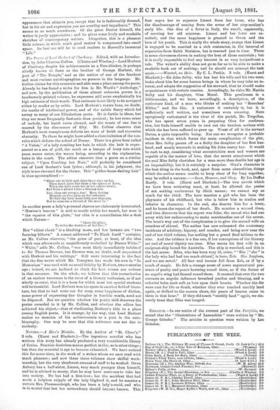NOVELS.—A Man's Mistake. By the Author of "St. Olave's." 3
vols. (Hurst and Blackett.)—The ingenious novelist who has written this story has already produced a very considerable library of fiction. Practice doubtless makes perfect in this, as in other things ; but then the material is apt to become exhausted. We have noticed this for some time, in the work of a writer whom we once read with much pleasure ; and now these three volumes show skilful work- manship, but the very slenderest amount of stuff to be worked. Owen Anbury has a half-sister, Linnet, very much younger than himself, and he is advised to marry, that he may have some-one to take her into society. He has had a first-love ; but the accident that had made a helpless cripple of the lady blighted it, and he marries a certain Mrs. Plummersleigh, who has been a lady's-maid, and who is in mortal fear lest her antecedents should become known. This fear urges her to separate Linnet from her lover, who has the disadvantage of coming from the scene of her step-mother's early life. She dies of a fever in Italy, the result, apparently, of meeting her old mistress. Linnet and her lover are re- united; and the same happiness is granted to Owen and the love of his youth. This is really the whole story, except that Linnet is engaged to be married to a rich contractor, in the interval of separation from Keith Moriston, but is rescued just in time. There is some cleverness shown in making the best of these materials ; but it is really impossible to feel any interest in so very insignificant a tale. The writer's ability does not go so far as to be able to make a readable book out of nothing; and he should not attempt the task again.—Wanted, an Heir. By C. L. Perkis. 3 vols. (Hurst and Blackett.)—Sir John Selby, who has lost his wife and his two sons, looks about him for some human beings in whom be may take an in- terest, and adopts the suggestion of his steward, that he should make acquaintance with certain cousins. Accordingly, he visits Mr. Martin Selby and his daughter, Oina Meru]. This • gentleman is a bibliomaniac, and we have, accordingly, a description, of the caricature kind, of a man who thinks of nothing but "Breeches' Bibles," and the like. A caricature it certainly is, but it is sufficiently well written, and sometimes even amusing. More egregiously caricatured is the vicar of the parish, Mr. Tregellas, who has spent seven years in preparing Oina for confirma- tion, but finds himself unable to root out the heathen notions with which she has been suffered to grow up. Worst of all is the servant Davus, a quite impossible being. Nor can we recognise a probable incident in that which forms the main complication of the plot, when Mrs. Selby passes off as a Selby the daughter of her first hus- band, and nearly succeeds in making Sir John marry her. It would be rash to say, considering what eccentricities men and women are capable of in the matter of love, that the secret attachment which the real Miss Selby cherishes for a man more than double her age is an impossibility, but it is certainly a surprise. Oina's character is the best thing in the book, and, apart from some absurdities, things which the author seems unable to keep clear of for long together, may be called a success.--Love, Honour, and Obey. By Iza Duff as Hardy. 3 vols. (Hurst and Blackett.)—The two novels which we have been reviewing must, at least, be allowed the praise of not seeking excitement by illicit means ; we cannot say as much for the third. The hero marries a girl who has been the playmate of his childhood, but who is below him in station and inferior in character. In the end, she deserts him for a lover,. and be hears the report of her death. He marries a second time, and then discovers that the report was false, the rascal who had run away with her endeavouring to make merchandise out of the secret. The hero's way out of the complication is to give the second wife an overdose of chloral. The author has now exhausted the customary incidents of adultery, bigamy, and murder, and being now near the end of her third volume, has nothing bat a grand final tableau to de- vise. And the tableau is a fine one, if her conceptions of the literary art and of moral dignity are true. Silas meets his first wife in an emigrant-ship bound for Australia. The ehip is wrecked, and this is the last scene. Silas, who has been very ill, cries, "'She ["she" is the lady who had had too much chloral] is here, Zeb. She forgives, and we are saved.' All fear and tremor fell from Zeb, as if by a touch of magic. He felt a strange sense of some supernatural pre- sence of purity and peace hovering round them, as if the flatter of an angel's wing had fanned round them. It seemed that over the two outcasts an angelic influence breathed pardon and blessing, and a celestial balm sank soft as love upon their hearts. Whether the die were cast for life or death, whether they ever touched earthly land again, or drifted to the unseen shore, the peace of heaven came to them in that hour." If they did touch "earthly land" again, we sin- cerely trust that Silas was hanged.






























 Previous page
Previous page